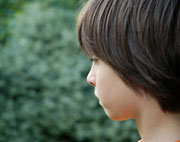- The Best Time of Day to Drink Bone Broth to Maximize Health Benefits
- 8 Ways to Increase Dopamine Naturally
- 7 Best Breads for Maintaining Stable Blood Sugar
- Gelatin vs. Collagen: Which is Best for Skin, Nails, and Joints?
- The Long-Term Effects of Daily Turmeric Supplements on Liver Health
- Could Your Grocery Store Meat Be Causing Recurring UTIs?
- Are You Making This Expensive Thermostat Error This Winter?
- Recognizing the Signs of Hypothyroidism
- 10 Strategies to Overcome Insomnia
- Could Artificial Sweeteners Be Aging the Brain Faster?
Scientists See Environmental Changes to Genes in Kids With Autism


New research appears to confirm that environmental influences on genes, and not just gene mutations, play a role in the development of autism.
Scientists from Albert Einstein College of Medicine of Yeshiva University in New York City said this may help explain why older pregnant women are at greater risk for having a baby with autism.
Previous research has suggested that gene mutations account for only about half of the risk for developing autism, the study authors pointed out.
Scientists know that men who are older than 40 are at greater risk for having a child with autism because of genetic mutations that accumulate over the years in sperm-making cells. Women who are 35 and older also face a greater chance for having a child with autism. The reason why, however, has been unclear.
In conducting the study, the researchers looked at environmental changes to genes that could help explain this increased risk, such as conditions in the mother’s uterus, stress and diet. These types of changes are called epigenetic changes.
The study, published online May 29 in the journal PLOS Genetics, involved 47 children with autism spectrum disorder (ASD) and 48 typically developing children of women aged 35 and older. The kids lived throughout the United States, as well as in Chile and Israel.
To look for differences in genes between the children, the researchers analyzed cells that lined their cheeks (the buccal epithelium).
“We hypothesized that whatever influences lead to ASD in children of older women probably are already present in the reproductive cells that produce the embryo or during the very earliest stages of embryonic development in cells that give rise to both the buccal epithelium and the brain,” study senior author Dr. John Greally, director of the Center for Epigenomics at Einstein, said in a news release.
The researchers first examined the children’s cheek cell samples for abnormal chromosome numbers, as well as other chromosomal defects. None of these abnormalities were found in the cheek cells of the children with autism or the typically developing children.
Next, the children’s cheek cells were examined for signs of environmental influences upon genes.
“If environmental influences were exerted during embryonic development, they would encode a “memory” in cells that we can detect as chemical alterations of genes,” Greally explained.
The researchers identified two groups of altered genes in a subset of the kids with autism that were different from the genes in the typically developing children. These altered genes, the researchers explained, are known to code for proteins involved in functions that have been shown to be impaired in those with autism.
“Our findings suggest that, at least in some individuals with an ASD, the same pathways in the brain seem to [be] hit by both [gene] mutations and epigenetic changes. So, the severity of someone’s ASD may depend on whether or not a gene mutation is accompanied by epigenetic alterations to related genes,” Greally said.
“In the case of older mothers at risk for having children with ASDs, one possible environmental influence might the aging process itself, which could disturb epigenetic patterns in their eggs, but there are other possibilities as well,” Greally said.
More information
The U.S. National Institute of Mental Health provides more information on autism spectrum disorders.
Source: HealthDay
Copyright © 2026 HealthDay. All rights reserved.










